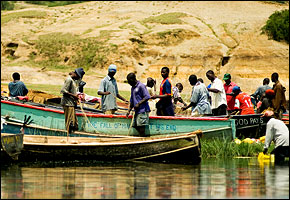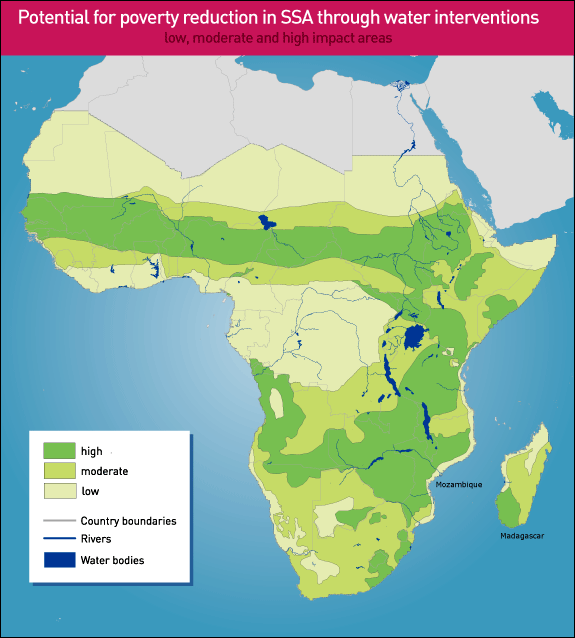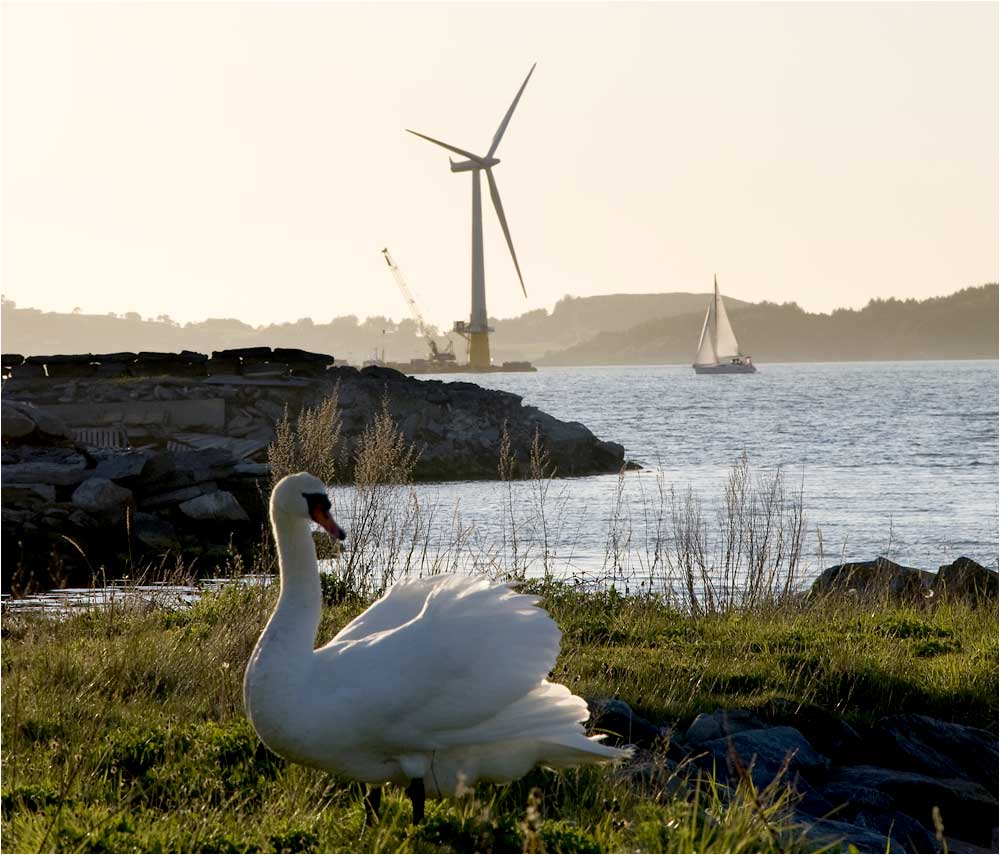Water key to ending poverty and hunger in Africa, UN report says

by C.T. Pope
Circle of Blue
Almost two-thirds of sub-Saharan Africa’s rural poor could benefit from investment in water, a new UN report finds.
The jointly commissioned report, Water and the Rural Poor, was presented by the Food and Agriculture Organization of the United Nations (FAO) and International Fund for Agricultural Development (IFAD) at the Sixteenth Annual UN Commission on Sustainable Development (CSD-16) on Monday.
“Insecure access to water for consumption and productive uses is a major constraint on poverty reduction in rural areas of sub-Saharan Africa (SSA),” the FAO and IFAD reported.
With almost half of Africa’s population suffering from water related diseases, the new assessment highlighted the potential for low-tech, highly localized, solutions to have a major impact the livelihoods of the rural poor.
Only 3 percent of sub-Saharan Africa’s land is under irrigation systems – elsewhere, crop production relies almost entirely on seasonal rainfall. Harvest rates rise and fall with unpredictable rain patterns.
Subsistence farmers, who account for nearly 80 percent of the agricultural activity in sub-Saharan Africa, are often the most vulnerable to seasonal variation in rainfall. The long-term impacts of such unpredictability make it impossible for these rural farmers to break from subsistence to small-scale production, thus reinforcing the cycle of poverty.
The report underlined the needs of these non-market oriented producers. “For millions of smallholder farmers, fishers and herders in SSA, water is one of the most important production assets, and securing access to and control and management of water is key to enhancing their livelihoods,” the UN report said.
Beyond the subsistence farmer, the FAO and IFAD suggested solutions for each economic farm class in the region – including, large-scale commercial farms, small market oriented farms, subsistence farms, and the highly vulnerable “survival” farms.
Each of these markets suffers from a variety of factors, including at the upper end, a lack of reliable fertilization options and irrigation systems; at the middle, a lack of healthy seeds and access credit; and at the lower ends, a loss of work from AIDS related issues and waterborne disease.
Stressing these “context-specific” solutions, the report divided sub-Saharan Africa into 13 livelihood zones – based on land-type, major crops grown, and the prevailing economic situation of the areas. Each of the 13 zones faces unique problems for which localized solutions are best suited.
Modeling their suggestions on existing success stories in Africa, the report offered real-world examples to better inform policy makers and investors. It recognized the heterogeneous nature of the water issues facing the region.
The report came as part of the CSD-16’s focus on agriculture, drought and desertification; Africa; and water and sanitation. And, while the FAO stressed that water management alone would not solve the poverty and hunger crisis in Africa, it emphasized the potential for well-targeted water interventions to significantly improve the livelihoods of Africa’s rural poor.
Photo: C.T. Pope / Circle of Blue
Map: Food and Agriculture Organization of the United Nations(FAO)/International Fund for Agricultural Development (IFAD), 2008
Links:
Joint Report: Water and the Rural Poor
Food and Agriculture Organization of the United Nations (FAO)
International Fund for Agricultural Development (IFAD)
UN Commission on Sustainable Development (CSD-16)
Circle of Blue’s east coast correspondent based in New York. He specializes on water conflict and the water-food-energy nexus. He previously worked as a political risk analyst covering equatorial Africa’s energy sector, and sustainable development in sub-Saharan Africa. Contact: Cody.Pope@circleofblue.org








I believe that the FIRST Thing we have to do is:
To Educate Women about SEX
They Most Know that Before to Get Pregnant,
a. Has to be a Husband To Support Her and their
innocent Child.
b. Is there enough Money to Feed Herself, during
Pregnancy, and After She has the Innocent Baby?
We have to educate Men and Women, that if they can not Support an Innocent Child, is BETTER Not to Bring Any BABY To Suffer to This Cruel World.
It makes me Very Sad to See Babies Crying, with Hunger, and Being Raised by a Single Parent.
And it Makes me Angry for That Stupidity and Ignorance of those Women and Men that Chose to Have A Baby when They Do Not Even Have Food or Money to Support Themselves.
Babies Never Ask to Come to This World!
I Highly Recommend:
Abortion and Sterilization
if Condoms are Not Available.
ALLAH Is Great!
“…Only 3 percent of sub-Saharan Africa’s land is under irrigation systems – elsewhere, crop production relies almost entirely on seasonal rainfall. Harvest rates rise and fall with unpredictable rain patterns…”
great post! thanks very much for sharing!